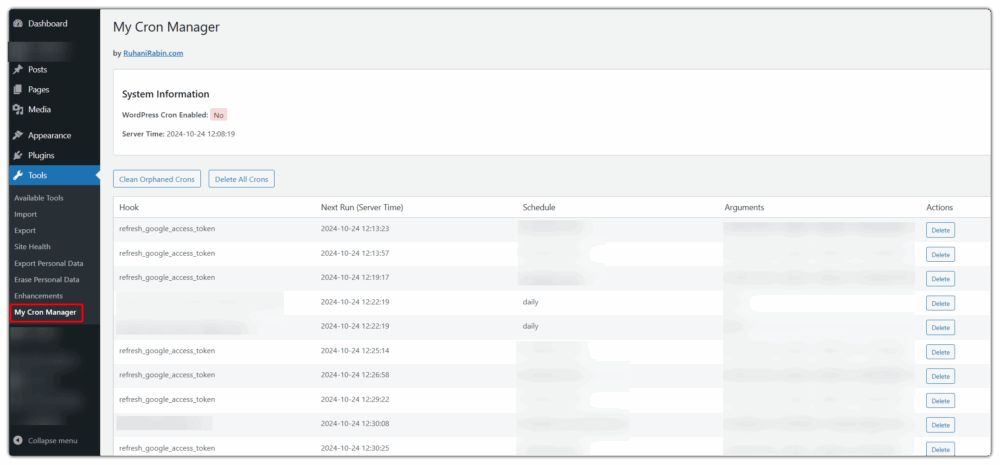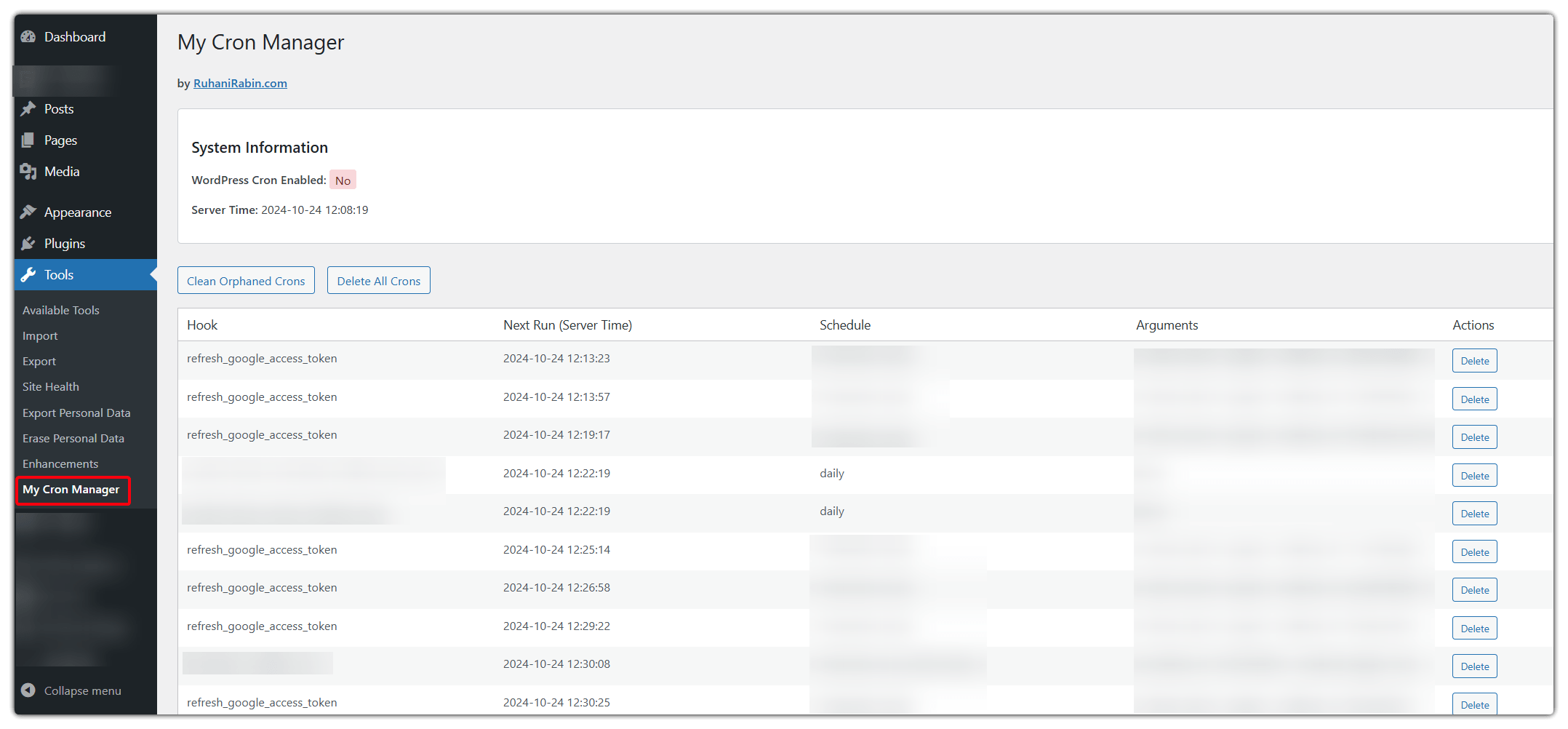- Custom Plugin
- |
- WordPress
- |
- WPCodebox
WordPress Cron Job Cleanup Made Easy – My Cron Manager
Why Should You Care About WordPress Cron Jobs?
My Cron Manager
What Can You Do With My Cron Manager?
1. View All Scheduled Tasks
- See exactly what’s running on your site
- Check when tasks are scheduled to run
- Understand which plugins are creating scheduled jobs
2. Clean Up Your Site
- Remove orphaned cron jobs from deactivated plugins
- Delete unnecessary scheduled tasks
- Keep your WordPress database clean and efficient
3. Monitor System Health
- Check if WordPress cron is enabled
- View server time settings
- Track task schedules in real-time

Key Benefits
- Complete Visibility: No more guessing what’s running behind the scenes
- Better Performance: Remove unnecessary tasks that might slow down your site
- Easy Cleanup: One-click solution to remove orphaned cron jobs
- Time Management: See exactly when tasks are scheduled to run
- Safe Operations: Confirmation prompts prevent accidental deletions
When Should You Use My Cron Manager?
- After uninstalling plugins
- When investigating site performance issues
- If scheduled posts aren’t publishing correctly
- During website maintenance
- When troubleshooting automation issues
Important Safety Tips
- Always Backup First: Before making any changes to cron jobs, backup your site
- Be Selective: Don’t delete cron jobs unless you’re sure what they do
- Test After Changes: Check your site’s functionality after removing cron jobs
- Keep Records: Note which cron jobs you remove in case you need to restore them
Who Should Use My Cron Manager?
- WordPress site administrators
- Web developers
- Site maintenance professionals
- Anyone managing multiple WordPress sites
Installation and Usage Tips
- Install using your favorite code snippets plugin
- Access from Tools > My Cron Manager in WordPress admin
- Review existing cron jobs before making changes
- Use the “Clean Orphaned Crons” feature regularly for maintenance
Common Questions Answered
Conclusion
Instructions for WPCodeBox:
- Add a new snippet in WPCodeBox.
- Paste the script
- Save it once, then Enable it, and Save it again
- Find it under menu Tools > My Cron Manager
Type: PHP
<?php
/*
Plugin Name: My Cron Manager
Description: Allows you to see your current WordPress cron events, delete them selectively and able to clean up orphaned cron events.
Version: 1.5
Author: Ruhani Rabin
Date: Thursday, October 24, 2024
Compatible with: WordPress 6.4.x
*/
if (!defined('ABSPATH')) {
exit;
}
// Only run in admin
if (!is_admin()) {
return;
}
class WP_Cron_Manager_Snippet {
private static $instance = null;
private $message = '';
private $deleted_count = 0;
public static function get_instance() {
if (self::$instance === null) {
self::$instance = new self();
}
return self::$instance;
}
private function __construct() {
add_action('admin_menu', array($this, 'add_admin_menu'));
add_action('admin_init', array($this, 'handle_actions'));
}
public function add_admin_menu() {
add_management_page(
'My Cron Manager',
'My Cron Manager',
'manage_options',
'wp-cron-manager-snippet',
array($this, 'admin_page')
);
}
public function handle_actions() {
if (!current_user_can('manage_options')) {
return;
}
if (isset($_POST['action']) && wp_verify_nonce($_POST['_wpnonce'], 'cron_manager_action')) {
switch ($_POST['action']) {
case 'delete_cron':
if (isset($_POST['cron_hook'])) {
$hook = sanitize_text_field($_POST['cron_hook']);
wp_clear_scheduled_hook($hook);
$this->message = sprintf('Cron job "%s" deleted successfully!', $hook);
add_action('admin_notices', array($this, 'show_success_notice'));
}
break;
case 'delete_all_crons':
$count = $this->remove_all_cron_jobs();
$this->message = sprintf('%d cron jobs deleted successfully!', $count);
add_action('admin_notices', array($this, 'show_success_notice'));
break;
case 'clean_orphaned':
$count = $this->clean_orphaned_cron_jobs();
$this->message = sprintf('%d orphaned cron jobs cleaned successfully!', $count);
add_action('admin_notices', array($this, 'show_success_notice'));
break;
}
}
}
public function show_success_notice() {
if (empty($this->message)) {
$this->message = 'Action completed successfully!';
}
?>
<div class="notice notice-success is-dismissible">
<p><?php echo esc_html($this->message); ?></p>
</div>
<?php
}
private function remove_all_cron_jobs() {
$count = 0;
$cron_jobs = _get_cron_array();
if (!empty($cron_jobs)) {
foreach ($cron_jobs as $timestamp => $cron) {
foreach ($cron as $hook => $events) {
wp_unschedule_event($timestamp, $hook);
$count++;
}
}
}
return $count;
}
private function clean_orphaned_cron_jobs() {
$count = 0;
$active_plugins = get_option('active_plugins');
$cron_jobs = _get_cron_array();
if (!empty($cron_jobs)) {
foreach ($cron_jobs as $timestamp => $cron) {
foreach ($cron as $hook => $events) {
$is_orphaned = true;
if (strpos($hook, 'wp_') === 0) {
$is_orphaned = false;
continue;
}
foreach ($active_plugins as $plugin) {
if (strpos($hook, basename(dirname($plugin))) !== false) {
$is_orphaned = false;
break;
}
}
if ($is_orphaned) {
wp_unschedule_event($timestamp, $hook);
$count++;
}
}
}
}
return $count;
}
public function admin_page() {
$cron_jobs = _get_cron_array();
?>
<style>
.wp-list-table .column-actions {
width: 100px;
}
.cron-info {
background: #fff;
padding: 15px;
border: 1px solid #ccd0d4;
border-radius: 4px;
margin-bottom: 20px;
}
.tablenav.top {
margin: 15px 0;
}
.tablenav.top form {
margin-right: 10px;
}
.success-toast {
position: fixed;
top: 50px;
right: 20px;
background: #fff;
padding: 15px 25px;
border-left: 4px solid #46b450;
box-shadow: 0 1px 4px rgba(0,0,0,0.15);
z-index: 999999;
}
</style>
<div class="wrap">
<h1>My Cron Manager</h1>
<h4>by <a href="https://www.ruhanirabin.com" target="_blank">RuhaniRabin.com</a></h4>
<div class="cron-info" style="margin-top: 20px;">
<h3>System Information</h3>
<p>
<strong>WordPress Cron Enabled: </strong>
<?php
$is_cron_enabled = !(defined('DISABLE_WP_CRON') && DISABLE_WP_CRON);
$status_style = $is_cron_enabled
? 'background-color: #d4edda; color: #155724; padding: 2px 6px; border-radius: 3px;'
: 'background-color: #f8d7da; color: #721c24; padding: 2px 6px; border-radius: 3px;';
?>
<span style="<?php echo $status_style; ?>">
<?php echo $is_cron_enabled ? 'Yes' : 'No'; ?>
</span>
</p>
<p>
<strong>Server Time: </strong>
<?php echo date('Y-m-d H:i:s'); ?>
</p>
</div>
<div class="tablenav top">
<form method="post" style="display: inline;">
<?php wp_nonce_field('cron_manager_action'); ?>
<input type="hidden" name="action" value="clean_orphaned">
<input type="submit" class="button" value="Clean Orphaned Crons">
</form>
<form method="post" style="display: inline;">
<?php wp_nonce_field('cron_manager_action'); ?>
<input type="hidden" name="action" value="delete_all_crons">
<input type="submit" class="button" value="Delete All Crons"
onclick="return confirm('Are you sure you want to delete all cron jobs?');">
</form>
</div>
<table class="wp-list-table widefat fixed striped">
<thead>
<tr>
<th>Hook</th>
<th>Next Run (Server Time)</th>
<th>Schedule</th>
<th>Arguments</th>
<th>Actions</th>
</tr>
</thead>
<tbody>
<?php
if (!empty($cron_jobs)) {
foreach ($cron_jobs as $timestamp => $cron) {
foreach ($cron as $hook => $events) {
foreach ($events as $event) {
?>
<tr>
<td><?php echo esc_html($hook); ?></td>
<td><?php echo esc_html(date('Y-m-d H:i:s', $timestamp)); ?></td>
<td><?php echo esc_html($event['schedule'] ?? 'One-time'); ?></td>
<td><?php echo !empty($event['args']) ? esc_html(json_encode($event['args'])) : 'None'; ?></td>
<td>
<form method="post" style="display: inline;">
<?php wp_nonce_field('cron_manager_action'); ?>
<input type="hidden" name="action" value="delete_cron">
<input type="hidden" name="cron_hook" value="<?php echo esc_attr($hook); ?>">
<input type="submit" class="button button-small" value="Delete"
onclick="return confirm('Are you sure you want to delete this cron job?');">
</form>
</td>
</tr>
<?php
}
}
}
} else {
?>
<tr>
<td colspan="5">No cron jobs found.</td>
</tr>
<?php
}
?>
</tbody>
</table>
</div>
<?php
}
}
// Initialize
WP_Cron_Manager_Snippet::get_instance();
